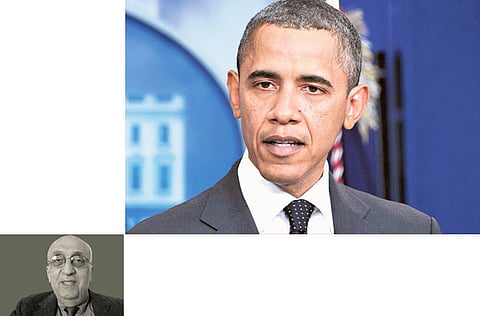Waiting for Obama’s next move on Israel
At present, Israel is in a state of flux

As my wife and I were just served with two cups of espresso at a busy sidewalk cafe in downtown Paris last week, a young Hasidic Jew stepped up to me and addressed me in French. I quickly interrupted him saying “I do not speak French”.
He then looked at me and said, “You are a Jew?” — an observation that was bewildering. I quickly responded, “No I am a Palestinian,” aware that he would be confused had I said I am an American of Palestinian origin. He appeared dumbfounded and as he turned quickly away from me I added: “I am a Semite, like you” in the hope that we can begin a conversation.
That remark did not impress him and he stepped away instantly.
I was actually disappointed because I had hoped to explain to him some of the intricacies of the Palestinian-Israeli conflict, stressing the point that we needed to talk together before we can resolve the decades-long conflict that has troubled the Middle East or, as I prefer to say, the Arab world.
Interestingly, the next day, that point was a theme stressed by Thomas L. Friedman, the New York Times columnist, who had served as his paper’s foreign correspondent in the 1960s when I was the editor of the Daily Star of Beirut, Lebanon, where we had met. (In fact, much later, and in response to my appeal from Washington where I had moved to in 1969, Friedman had graciously helped my mother leave Beirut aboard a US naval ship when the US government had advised Americans to leave Lebanon during the Lebanese civil war).
In his June 4 column, which I read in the Paris-based International Herald Tribune, he noted that Israel, as a result of increased international social networking, has become “a pariah state because of its West Bank occupation”. He continued, “It is not a good trend for Israel. It makes it much more dependent on America alone for support.”
He added if Israel partnered “with the current moderate Palestinian leadership in the West Bank, (it) has a chance to create a modern, econ-omically thriving, democratic secular state where Christians and Muslims would live side by side — next to Jews,” provided it would cede “most of the West Bank and Arab neighbourhoods in [occupied] East Jerusalem”.
The key point here, as I hoped to stress to the unfriendly Hasidic Jew, is that Israel has to abandon its current aggressive and unyielding policies. It then should attempt face-to-face talks with the Palestinians and Arabs, whose governments have introduced an amazing Arab Peace Initiative that guaranteed Arab recognition once Israel reaches an honourable settlement with the Palestinians. Interestingly, it has been revealed by a prominent Israeli journalist, Akiva Eldar, that 73.5 per cent of the Hebrew-speaking public had never heard of the Arab Peace Initiative or had heard just a hint of it but remains unfamiliar with the details.
At present, Israel is in a state of flux. The “current tempest,” according to Jodi Rudoren, the New York Times correspondent in Israel, began when Israeli Deputy Defence Minister, Danny Danon, a hawkish member of Prime Minister Benjamin Netanyahu’s Likud Party, declared that “there is no [Israeli] majority for a two-state solution” within Likud or Israel’s government coalition. Other right-wing cabinet ministers like Housing Minister Naftali Bennett and Defence Minister Moshe Ya’alon echoed similar negative statements as in the words of Bennett, “the idea that a Palestinian state should be established within the land of Israel has reached a dead end”.
Curtailing assistance
Even former US president, Bill Clinton, repeated arguments, made for years by Israeli doves and centrists, that increasing numbers of Palestinians under Israeli rule will ultimately force the country to lose either its Jewish majority or its democratic nature if Palestinians are not given rights as citizens.
All eyes will now be focused on the upcoming visits to the region by Catherine Ashton, the European Union’s (EU) Foreign Policy Chief, who is not very popular because of the EU’s focus on Israeli colonies, now numbering more than 100 in the West Bank and occupied East Jerusalem, where some 500,000 Israelis are illegally settled.
However, the key point remains about the mysterious next move of the Barack Obama administration, which, much to Israel’s advantage, is nowadays overwhelmed by the crisis in neighbouring Syria, where more than 90,000 Syrians have perished in the ongoing conflict, now in its 30th month. Regardless, the only course that US Secretary of State John Kerry, who is also going to be in the region later this week, has is to twist Israel’s arms, curtailing US financial assistance until Israel takes significant steps towards a peace settlement. Otherwise, the tide will turn against both sides, much to the benefit of Palestinians calling for a one-state solution — an alternative that is gaining growing sympathy among Palestinians and some Israelis.
George Hishmeh is a Washington-based columnist. He can be contacted at ghishmeh@gulfnews.com



